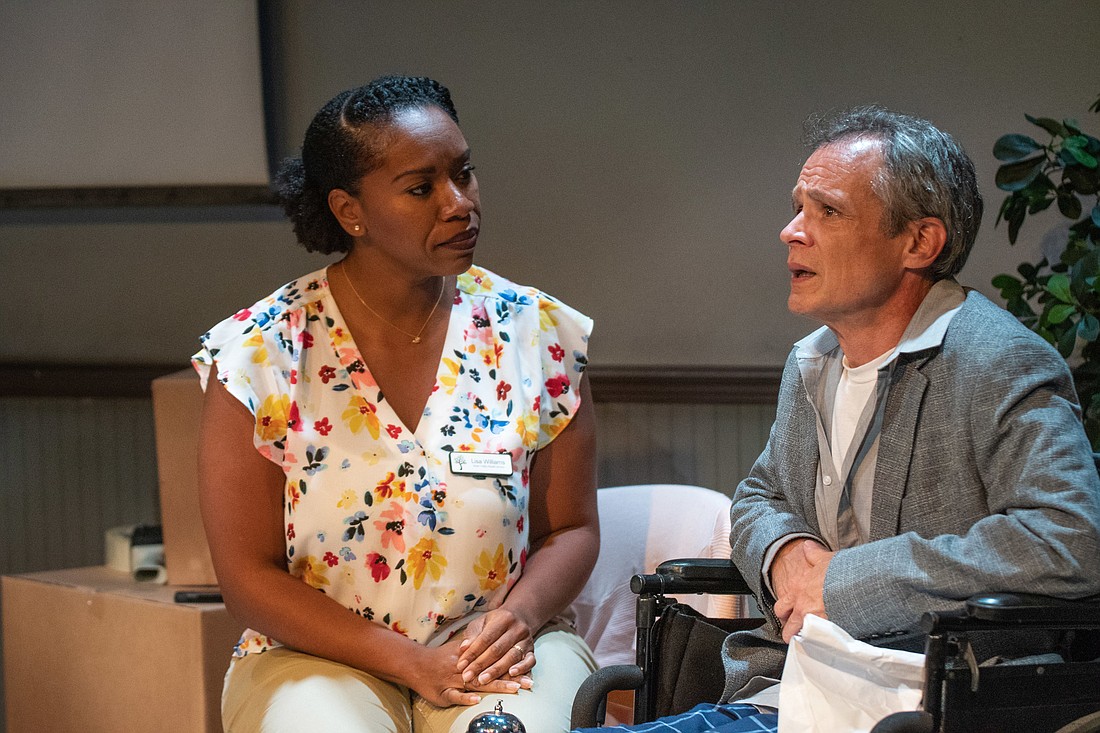- April 19, 2024
-
-
Loading

Loading

There's a particularly unpleasant wake-up call that resonates through Will Eno’s “Wakey, Wakey.” His brilliant, frustrating, quirky, enigmatic, witty, heart-rending, playful play is now on stage at Urbanite Theatre.
The first thing audiences see is a man (James FitzGerald) lying facedown on the floor. (The program calls him “Guy.” We will, too.) He’s waking up — and wondering if it’s time for the big sleep. “Is it now? I thought I had more time.” He somehow crawls back to his wheelchair. After that, he speaks to the audience directly — and occasionally singles out specific patrons. Guy’s extended rap session is in full force.
His session unfolds in a big, institutional room. It’s empty, except for stacks of cardboard boxes full of Guy’s old stuff. A door leads … somewhere. The rear wall boasts a projection screen. Guy periodically switches it on, sharing everything from funny YouTube videos to New Age-y meditation exercises. Throughout his spiel, Guy asks many pointed questions. But avoids the obvious ones …
Who is this character? Is he dying — or dead? Who is he speaking to? Where are we? Why are we here? Is this really happening?
Your guess is as good as mine. Eno strips his play of context. His character’s an Everyman — a man who could be experiencing everyone’s final scene. That’s all you really know.
The character’s body language speaks of pain and sickness. Guy stoically hides his agony, but each move hurts. In case you miss this hint, there’s also that wheelchair. In case you miss that, there’s also a reference to the blandly institutional hospital cafeteria in the End of Life Ward.
So why is Guy sharing an extended monologue?
He’s wrestling with a problem.
Guy is facing the ultimate final exam. What have you learned in life? Please share your answers in the remaining time allotted. That’s exactly what Guy’s trying to do. He’s written down his important points on 3x5 cards …
“Time is your friend and time is your enemy.”
“Hearing certain words can create the realities behind those words, in the hearer, and in the hearer’s body.”
“You will produce two swimming pools’ worth of saliva in your life…Use it wisely.”
Guy’s insights span the sublime and the ridiculous. Smart or silly, he wants to share as many as he can. He’s like a nervous high school student taking his SATs. He knows the clock is ticking. At some point, the bell will ding. And he’ll have to put down his pencil.
This works beautifully as a one-person monologue. Imagine my surprise when another character appears — Lisa (Brittney M. Caldwell). She might be a caregiver, an angel, or a phantom in Guy’s mind. But she’s gentle and nurturing, and does a healing dance around Guy when he cramps up with pain.
The play (like life itself) finally comes to an end. There’s no fortune cookie conclusion, though you do get literal fortune cookies on your way out. And balloons!
Eno’s play has no clear dramatic arc. It’s non-linear—meandering and rambling. Director Brendan Ragan works deftly with the currents and crosscurrents of the swirling river of talk.
FitzGerald puts his heart and soul into his portrayal of Guy. His physical characterization evokes a body on the verge of breakdown. His nuanced voice work reminds me of John Lithgow. FitzGerald conveys a sense of his character’s amazing intelligence; the wheels of his mind turning, and sometimes turning back on itself, to take back or qualify his words. His character’s smart, self-deprecating, loving and sweet. Caldwell’s angelic Lisa is sweet, too. I love her scenes, though she doesn’t have much to work with. Her briefly seen character feels like a fifth wheel.
Dee Sullivan clothes these characters fittingly. The drapes and folds of Guy’s oversized suit make him look like a skeletal scarecrow. The generic happy meadows on Lisa’s caregiver garb capture the empty optimism of the real thing.
The action unfolds in an indeterminate space—maybe real, maybe not. Jeff Weber’s beautifully banal set, Mike Wood’s lighting and Alex Pinchin’s sound design smartly convey that ambiguous quality. Props also to Zachary E. Hines for Guy’s improbable PowerPoint presentation. These artists never telegraph a sense of dreamy surrealism. Everything’s believable — just a little bit off.
What’s the point of all this brilliance?
An old-school Aristotelian dramatic structure would build up to some grand revelation. Guy’s musings would have a payoff. A climax, an answer, a glorious epiphany or a terrible insight he’s finally forced to face.
Life is a ride. Enjoy it while you can.
There’s no flash of satori. This play gives you plenty of little answers, but no final answer.
Guy’s wisdom is the stuff you already know — and usually ignore. Seize the day. Pay attention. Be nice to people. Life is short.
The play grabs you with the force of Guy’s personality, not the philosophical points he’s making. Rightly so. He’s a fascinating, well-written character.
“Wakey, Wakey” initially reminded me of Samuel Beckett’s musings on life’s futility in plays like “Endgame" and “Krapp’s Last Tape.” But the experience is less like Beckett, and more like the late Spalding Gray’s performance art. If Guy had been sitting behind a table doing a one-man rap session, it’d be hard to tell the two apart.
Guy’s a compelling character. That’s why the play works. And why your heart goes out to him.
It’s Final Exam time. Guy flails about, desperately trying to share his few nuggets of wisdom. Fighting to prove his life mattered.
Fighting to prove life itself matters.